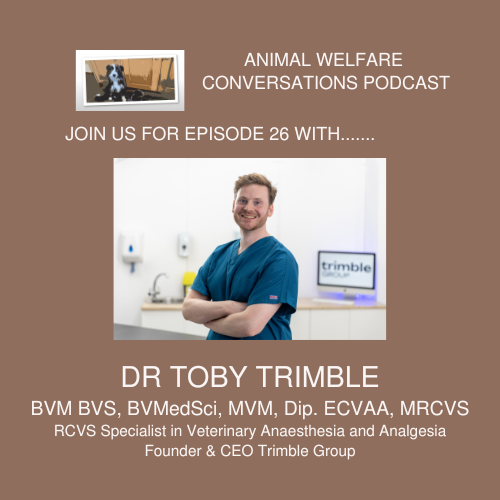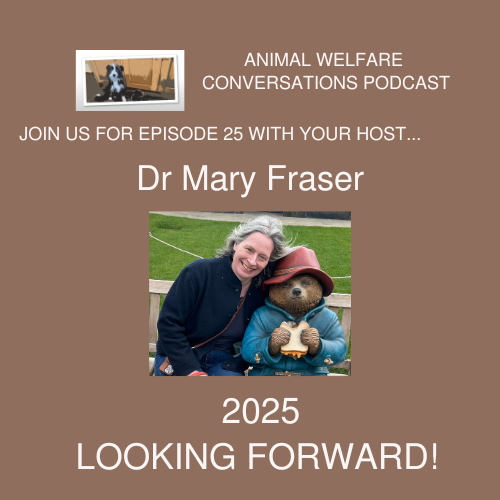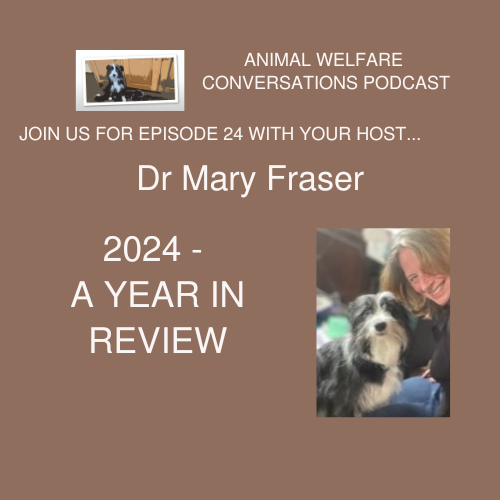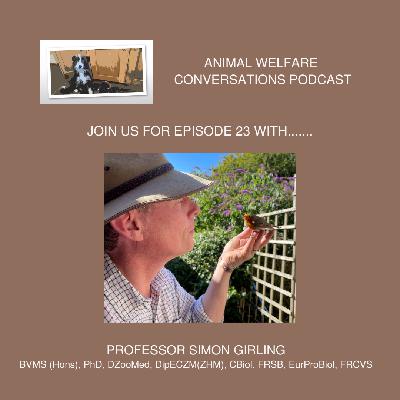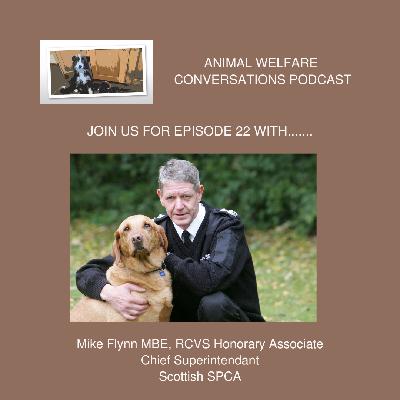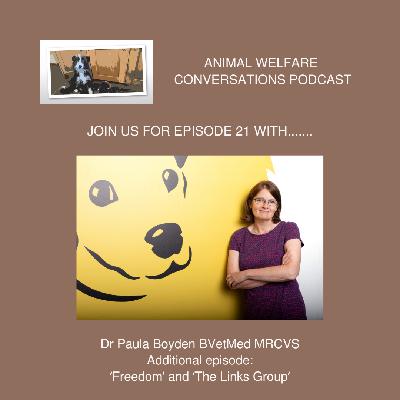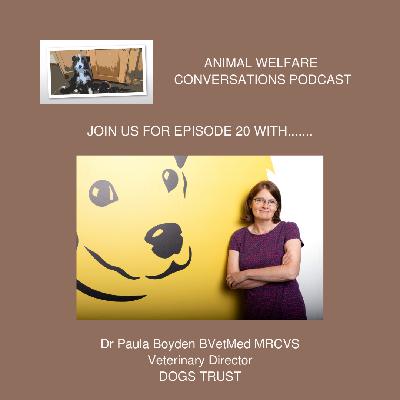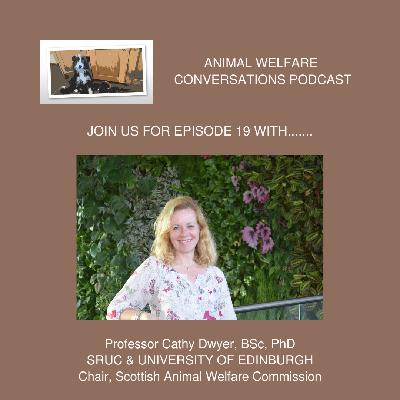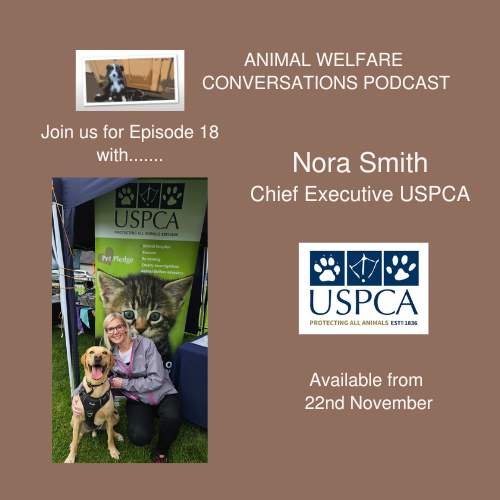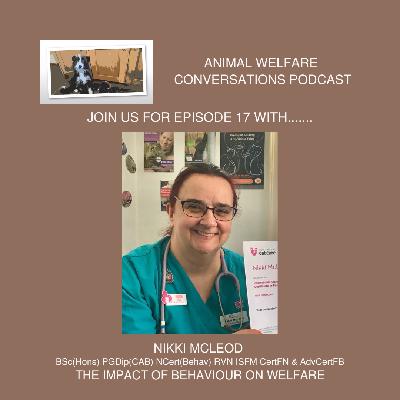Discover Animal Welfare Conversations
Animal Welfare Conversations

Animal Welfare Conversations
Author: maryvy
Subscribed: 1Played: 58Subscribe
Share
© Copyright 2023 All rights reserved.
Description
Join us as we talk to people working towards a common goal - to improve animal welfare.
We’ll chat to veterinary surgeons, veterinary nurses, animal owners, conservationists and others who have an important part to play in care and decision making about the lives of pets, domestic, farm or zoo animals and wildlife.
We’re not afraid to challenge assumptions and question current beliefs.
To keep up to date join our mailing list at https://www.animalwelfareconversation.com/
We’ll chat to veterinary surgeons, veterinary nurses, animal owners, conservationists and others who have an important part to play in care and decision making about the lives of pets, domestic, farm or zoo animals and wildlife.
We’re not afraid to challenge assumptions and question current beliefs.
To keep up to date join our mailing list at https://www.animalwelfareconversation.com/
38 Episodes
Reverse
Welcome to 2026, and new episodes of the Animal Welfare Conversation.
In this introductory episode we have a sneak preview of the new interviews, covering a broad range of topics including animal welfare science, climate change, the sixth mass extinction and dog breeding.
So much is happening in the veterinary profession at the moment, including the CMA report and review of the Veterinary Surgeons Act. There are many opportunities here for the veterinary profession to have a greater influence on animal welfare and also to develop more confidence within the profession itself.
We also have an update about the Animal Welfare Medal. We received many, many nominations and it has taken much longer than I anticipated to reach a final decision. We're awarding more than one winner, and will be contacting everyone this week. Many thanks to vet nurses Emma Ruggles and Nikki McLeod for joining me on the judging panel - it was a very difficult decision. More information will be released soon.
Please sign up to our newsletter to keep up to date with everything that's happening. The first full episode of 2026 will be along on Friday 27th February.
I hope you enjoy the Animal Welfare Conversation.
This week, we had the privilege of speaking with Professor Eddie Clutton and Dr Polly Taylor, both distinguished anaesthetists and two of the co-editors of Veterinary Controversies and Ethical Dilemmas. Their book, now highly regarded within the veterinary profession, raises important questions about the current veterinary landscape, approaches to treatment, and standards of animal care. Our discussion covered a range of complex topics, including moral dilemmas, euthanasia, and over-treatment, offering diverse perspectives and highlighting unresolved issues within the profession.
The conversation explored the financial, emotional, and societal costs associated with animal treatment, prompting reflection on what outcomes we truly seek for our animals.
We hope you find this discussion on animal welfare both thought-provoking and informative.
Biographies
Dr PM Taylor MA VetMB PhD DipECVAA FRCVS
European & RCVS Veterinary Specialist in Anaesthesia
Polly graduated from Cambridge many years ago and worked in general practice then clinical academia in Cambridge University and the Animal Health Trust. Since 2002 she has been an independent consultant in veterinary anaesthesia, covering clinical anaesthesia, teaching, drug registration and research; numerous papers on anaesthesia and analgesia have resulted. Polly is a director of Topcat Metrology Ltd, developing bespoke nociceptive threshold testing systems for several animal species. She was a member of the Advisory Council for the Misuse of Drugs (2002-2010) and has continued to be an advocate for the veterinary profession regarding drug legislation. Her most recent activity putting her head above the parapet is to encourage the profession to understand that overtreatment of animals “just because we can” is often not in their best interests.
Prof Eddie Clutton BVSc (Hons) DVA DipECVAA FRCVS
European & RCVS Veterinary Specialist in Anaesthesia
Eddie Clutton graduated from the University of Liverpool in 1981 and completed postgraduate training in anaesthesia at the Department of Anaesthesia, The Royal Liverpool Hospital. After serving as Assistant Professor in Veterinary Anaesthesiology at the University of Virginia–Maryland, USA, he obtained the RCVS Diploma in Veterinary Anaesthesia in 1985. From 1990 to 2015, he led Veterinary Anaesthesia at the Royal (Dick) School of Veterinary Studies, University of Edinburgh, and was appointed Chair of Veterinary Anaesthesiology in 2007.
He is a Diplomate of the European College of Veterinary Anaesthesia and has held leadership roles including Editor-in-Chief of Veterinary Anaesthesia and Analgesia and President of the Association of Veterinary Anaesthetists. His professional memberships include the Royal College of Anaesthetists, the Association of Veterinary Anaesthetists, the Animal Welfare Science, Ethics and Law Association, the Laboratory Animal Veterinary Association, the Laboratory Animal Science Association and the Association of Veterinary Ethical Committees.
Eddie’s research focuses on pain management, anaesthesia monitoring in pigs and sheep, and medical ethics. He co-founded EthicsFirst in 2016 and the Research Animal Anaesthesia Network (RAAN) in 2025. He currently serves as Clinical Director of the Wellcome Trust Critical Care Laboratory for Large Animals at the Roslin Institute.
His contributions have been recognised with the Morpheus Award (2019) for exceptional contributions to Veterinary anaesthesia, analgesia and intensive care, RCVS Fellowship (2019) meritorious contribution to knowledge, and the Dalrymple-Champneys Cup and Medal (2024), the British Veterinary Association's Advancement of Veterinary Science Award, for the distinctive contributions he has made to the field of veterinary anaesthesia.. He was senior author of the FELASA guidelines for anaesthesia in biomedical research involving large animals.
Further Information
Veterinary Controversies and Ethical Dilemmas: Provocative Reflections
This week we catch up with Dr Jos Bongers, a veterinary neurologist from Glasgow Vet School, and Professor Sameer Zuberi, a paediatric neurologist at the Royal Hospital for Children in Glasgow. They discuss their career paths, the similarities and differences between human and veterinary neurology, and the impact of epilepsy on welfare of both animals and children.
We consider a variety of different topics including seizure classification and video diagnostics, similarities between human and veterinary neurology, welfare and quality of life, treatment of epilepsy and clinical trials, one medicine, and future breakthroughs in the treatment of epilepsy.
The discussion underscores the value of cross-disciplinary collaboration, technological innovation (especially video and AI), and a holistic approach to welfare in both human and veterinary contexts. Jos and Sameer hope for faster, more accurate diagnoses and treatments, particularly in resource-limited settings, and highlight the shared motivation to improve lives across species.
Biographies
Professor Sameer Zuberi MB ChB (Ed), MD, FRCP(Ed), FRCPCH
Professor Sameer Zuberi is a Consultant Paediatric Neurologist at the Royal Hospital for Children, Glasgow and Honorary Professor in the School of Health & Wellbeing at the University of Glasgow, leading the Paediatric Neurosciences Research Group. He studied at the University of Edinburgh and undertook postgraduate paediatric and neurology training in Edinburgh, Glasgow and Sydney. He is Clinical Lead of the Scottish National Genetic Epilepsy Service, Trustee of Health Innovation Scotland and Neurodevelopment Theme Lead of the Epilepsy Research Institute UK. He is immediate Past President of the European Paediatric Neurology Society, vice President of the European Brain Council (advocating for better brain health globally) and President-Elect of the British Paediatric Neurology Association.
He has been active in the International League Against Epilepsy, serving on many Task Forces, and was Chair of the Commission on Classification & Terminology 2013-17. His research group have a broad focus in childhood epilepsies including genetics, epidemiology, outcomes, trials & precision therapies and global health. In recent years he has developed and researched innovative technologies including smartphone video and AI for diagnosis & management, and devices to prevent sudden unexpected death in epilepsy. He has published more than 150 academic papers and many book chapters.
Sameer’s family includes a cat and a cocker spaniel. He is excited about collaborating with veterinary neurologists and owners in a project to improve classification of seizures in dogs using smartphone video.
Dr Jos Bongers MSc MVM DipECVN MRCVS
Jos is a veterinary neurologist with a primary focus on developing and expanding the Glasgow Seizure Clinic to improve diagnosis and treatment for pets with epilepsy and to strengthen support networks for their carers. She has also recently begun a PhD that examines the use of home video recordings for determining seizure semiology in dogs, guided by methods used in human medicine. She intends for this project to promote closer links between human and veterinary neurology and to deepen understanding of epilepsy across species. More information on the Seizure Clinic can be found via: https://petseizureclinic.co.uk/.
Other information
One Medicine and Humanimal Trust Home - Humanimal Trust
Decision making mini-series - episode 3 - Bias
In this episode we discuss the complexities of decision-making in veterinary medicine, focusing on biases that can impact clinical reasoning and client communication. We look at how biases can lead to misdiagnosis, affect treatment choices, influence client trust and ultimately impact on animal welfare.
We consider some of the more common biases, such as confirmation bias, anchoring bias, and availability bias, and emphasizes the importance of recognizing and mitigating these biases to improve diagnostic accuracy and patient safety.
As usual, we have more resources on this topic at Vet Your Decisions
In a future episode we're going to look at our favourite text books on animal welfare and decision making. I'm currently reading Veterinary Controversies and Ethical Dilemmas | Provocative Reflection (there are so many topics in here!) and it would be great if you could suggest your favourite books in this area.
A couple of the authors in this text book Tanya Stephens and Sean Wensley very kindly supported the The Animal Welfare Conversation podcast in the early days. If you've not listened to them yet then you can catch up here.
We hope you will join The Animal Welfare Conversation:
Sign up to the podcast mailing list Animal Welfare Conversations
Sign up to Vet Your Decisions mailing list Vet Your Decisions: Essential Vet Advice for Pet Owners (scroll to the bottom of the home page).
Y6BjMEfdwGKs9qYbuqVm
In the second episode focussing on Clinical Decision Making, this week we look at clinical reasoning. Last week we discussed the way in which vets make decisions and all of the things that they are juggling at the one time, considering their own knowledge and experience, alongside the needs of the owner and the needs of the animal.
Clinical reasoning encompasses all of the processes that take place in a consultation, and that lead to the decision making process. It can be described in different ways, but one approach is to consider: collecting information, processing it, identifying problems, setting goals, taking action, evaluating outcomes, and reflecting.
Alongside this we need to consider the importance of owner input, thorough patient history, and avoiding bias, alongside the need for clear communication with owners about treatment plans and costs.
More information can be found at Vet Your Decisions
In this episode of the Animal Welfare Conversation podcast, we take a break from the interviews, and will spend the next few weeks looking at the complexities of decision-making in veterinary medicine and how this relates to animal welfare.
In this first episode we look at the ways in which vets make decisions, and the mental gymnastics that go on when making clinical decisions. We look at the ways in which vets consider their own knowledge and experience, the owner wishes, and the needs of the animal.
Find out more about clinical decision making at:
Vet Your Decisions: Essential Vet Advice for Pet Owners
Vet Your Decisions Blog
Speaker Biography
Mary Fraser is the founder and host of The Animal Welfare Conversation podcast and Vet Your Decisions.
Dr Mary Fraser is a veterinary surgeon who has bridged the gap between human and veterinary medicine. She began her career in mixed practice, completed a PhD in canine dermatology funded by The Guide Dogs for the Blind Association and then moved into education and clinical research in both further / higher education and the corporate sector.
Along the way she has set up her own small animal veterinary practice, developed new training pathways for veterinary nurses, worked with Stirling University’s Innovation Centre and is now Executive Director of Education at the Royal College of Physicians of Edinburgh.
She is an Honorary Clinical Associate Professor at Glasgow University, and in 2017 she was awarded Fellowship of the Royal College of Veterinary Surgeons (FRCVS) for Meritorious Contributions to the Profession.
Her main interests, alongside One Medicine, are animal welfare, veterinary and medical education, clinical decision making and charitable work through Humanimal Trust and UHI Perth.
Welcome to the next episode of The Animal Welfare Conversation.
This week we meet Dr Rowena Packer, of the RVC.
Rowena is the Senior Lecturer in Companion Animal Behaviour and Welfare Science at the Royal Veterinary College, London, where she leads a research group exploring diverse topics in this area, including the impact of chronic and inherited disorders on dog behaviour and welfare, the impact of owner knowledge, attitudes and behaviour on canine welfare, and caregiver burden.
In this episode we delve into the controversial world of dog breeding, where human preferences for "cute" features often override concerns about animal health – particularly in brachycephalic breeds like pugs and French Bulldogs.
The podcast reveals how human biases in pet ownership directly impact animal welfare, challenging listeners to rethink their motivations behind breeding choices.
The discussion on brachycephalic breeds uncovers the often-overlooked health implications of emotional attachment in pet ownership, urging a shift toward prioritizing animal well-being over aesthetic preferences.
Dr Rowena Packer, BSc (Hons) PhD PGCert(VetEd) FHEA
Rowena is the Senior Lecturer in Companion Animal Behaviour and Welfare Science at the Royal Veterinary College, London. Rowena leads a research group exploring diverse topics in this area, including the impact of chronic and inherited disorders on dog behaviour and welfare, the impact of owner knowledge, attitudes and behaviour on canine welfare, and caregiver burden.
She has received >£2 million of research funding from diverse sources, with ~£1 million held as Principal Investigator.
Rowena is a frequent flyer on the conference circuit and has presented her research internationally, including in the USA, Australia, Canda, and across much of Europe.
Rowena has co-authored >100 peer reviewed papers and book chapters and co-edited the textbook ‘Health and Welfare of Brachycephalic (Flat-faced) Companion Animals’ (2021). Rowena holds a PhD from the Royal Veterinary College (2013) which explored the impact of extreme conformation on canine health, and has continued to research and drive initiatives on this topic for 16 years.
Rowena is a founding member of Brachycephalic Working Group and the Legal Advisory Group on Extreme Conformation in Dogs.
Find out more about Rowena’s research at https://www.rvc.ac.uk/about/our-people/rowena-packer
NOMINATE YOUR ANIMAL WELFARE HERE NOW:
If you haven't already done so, please nominate your animal welfare hero for our new award HERE
Professor Andrew Knight
BVMS BSc PhD PFHEA DipECAWBM DipACAW MANZCVS FRCVS
Welcome to the next episode of the Animal Welfare Conversation. And this week we caught up with Prof Andrew Knight, animal welfare advocate, researcher and campaigner. In this episode we about Andrew’s journey of campaigning for animal welfare. We hear about the impact of livestock farming on climate change, the future of vegan diets and how this relates to animal welfare. We also consider how the veterinary profession can play a pivotal role in advocating for systemic change beyond the clinic.
Andrew established and directed the Centre for Animal Welfare at the University of Winchester; is a Principal Fellow of Advance HE; EBVS European and RCVS Veterinary Specialist in Animal Welfare Science, Ethics and Law; American & New Zealand Veterinary Specialist in Animal Welfare and a Fellow of the Royal College of Veterinary Surgeons.
In 2019 Andrew was awarded the Society for Veterinary Medical Ethics Shomer Award and also received the Humane Society Veterinary Medical Association Humane Achievement Award
Andrew has published a wide range of academic papers and books on animal welfare including The Costs and Benefits of Animal Experiments and co-edited the Routledge Handbook of Animal Welfare.
Further Information
Sites
https://www.andrewknight.info
https://sustainablepetfood.info
https://humanelearning.info
https://animalexperiments.info
socials
https://www.linkedin.com/in/andrew-knight-409b7434/
https://www.facebook.com/profile.php?id=100046421604769
https://www.youtube.com/c/andrewknight
Key infographics
Knight A (2023) The relative benefits for environmental sustainability of vegan diets for dogs, cats and people. PLoS ONE 18(10): e0291791. https://doi.org/10.1371/journal.pone.0291791
Knight A, Bauer A, Brown H (2023) Vegan versus meat-based cat food: Guardian-reported health outcomes in 1,369 cats, after controlling for feline demographic factors. PLoS ONE 18(9): e0284132. https://doi.org/10.1371/journal.pone.0284132
Vegan dog health
Other Information:
http://aknight.info/articles/pet-food
And finally.........
Please follow us on social media, and if you haven’t yet nominated you Animal Welfare Hero, please take time to nominate them. Find out more here. Alex Fraser Medal for Animal Welfare | Girling & Fraser Ltd Closing date is 30th September.
What makes a good life? Part 2
In this episode of the Animal Welfare Conversation, we continue the conversation with Dr Dan O’Neill of the RVC. Dan is well known in the veterinary profession for his work with VetCompass and animal welfare. Dan is a Fellow of the Royal College of Veterinary Surgeons, and has received many awards in recent years from BSAVA, Kennel Club Charitable Trust, and was awarded the RCVS Impact Award in 2025.
In this 2 part podcast episode we examine an animal’s capacity for a good life and the opportunities they get to fulfil that. In this eye-opening episode, Dr. O'Neill challenges traditional veterinary approaches, arguing that good animal welfare extends far beyond the absence of disease. He presents a groundbreaking framework based on two key elements: an animal's capacity for a good life and their opportunity to fulfil that capacity. Through compelling examples, including the concerning rise of brachycephalic breeds in the UK we see how human choices can significantly impact animals' ability to live naturally and happily.
BIOGRAPHY
Dr Dan O’Neill , Associate Professor Companion Animal Epidemiology, RVC
MVB BSc(hons) GPCert(SAP) GPCert(FelP) GPCert(Derm) GPCert(B&PS) PGCertVetEd FHEA MSc(VetEpi) PhD FRCVS
Following 22 years in general veterinary practice, Dan moved to academia to gain a PhD and now co-leads the RVC VetCompass™ Programme.
With over 170 papers, he also co-authored the books ‘Breed Predispositions to Disease in Dogs and Cats’ and ‘Health and Welfare of Brachycephalic (Flat-faced) Companion Animals’.
He is a founding member of the UK Brachycephalic Working Group, the UK Legal Advisory Group on Extreme Conformation in Dogs and the International Collaborative on Extreme Conformation in Dogs.
Dan was awarded a Fellowship of the Royal College of Veterinary Surgeons in 2018, the BSAVA Blaine Award for Advancement of Small Animal Science in 2019, the International Canine Health Award from the Kennel Club Charitable Trust in 2021, the UK All Party Parliamentary Group ‘Phillippa Robinson Dog Welfare Award’ in 2024 and the RCVS Impact Award in 2025. Dan is currently developing his Innate Health Concept as an application for the All-Party Parliamentary Group for Animal Welfare (APGAW) that aims to shift the UK dog demographic progressively away from extreme conformation over the coming decade.
What makes a good life? Part 1
In this episode of the Animal Welfare Conversation, we meet Dr Dan O’Neill of the RVC. Dan is well known in the veterinary profession for his work with VetCompass and animal welfare. Dan is a Fellow of the Royal College of Veterinary Surgeons, and has received many awards in recent years from BSAVA, Kennel Club Charitable Trust, and was awarded the RCVS Impact Award in 2025.
In this 2 part podcast episode we examine an animal’s capacity for a good life and the opportunities they get to fulfil that. In this eye-opening episode, Dr. O'Neill challenges traditional veterinary approaches, arguing that good animal welfare extends far beyond the absence of disease. He presents a groundbreaking framework based on two key elements: an animal's capacity for a good life and their opportunity to fulfil that capacity. Through compelling examples, including the concerning rise of brachycephalic breeds in the UK we see how human choices can significantly impact animals' ability to live naturally and happily.
BIOGRAPHY
Dr Dan O’Neill , Associate Professor Companion Animal Epidemiology, RVC
MVB BSc(Hons) GPCert(SAP) GPCert(FelP) GPCert(Derm) GPCert(B&PS) PGCertVetEd FHEA MSc(VetEpi) PhD FRCVS
Following 22 years in general veterinary practice, Dan moved to academia to gain a PhD and now co-leads the RVC VetCompass™ Programme.
With over 170 papers, he also co-authored the books ‘Breed Predispositions to Disease in Dogs and Cats’ and ‘Health and Welfare of Brachycephalic (Flat-faced) Companion Animals’.
He is a founding member of the UK Brachycephalic Working Group, the UK Legal Advisory Group on Extreme Conformation in Dogs and the International Collaborative on Extreme Conformation in Dogs.
Dan was awarded a Fellowship of the Royal College of Veterinary Surgeons in 2018, the BSAVA Blaine Award for Advancement of Small Animal Science in 2019, the International Canine Health Award from the Kennel Club Charitable Trust in 2021, the UK All Party Parliamentary Group ‘Phillippa Robinson Dog Welfare Award’ in 2024 and the RCVS Impact Award in 2025. Dan is currently developing his Innate Health Concept as an application for the All-Party Parliamentary Group for Animal Welfare (APGAW) that aims to shift the UK dog demographic progressively away from extreme conformation over the coming decade.
Welcome back!
In this episode we catch up with Dr Toby Trimble, the founder of Trimble Group, a film production company, reinventing education for animal health. Listeners to the podcast will know that education features a lot in conversations about animal welfare, so, in this episode we get the chance to look at this in more detail and discover just why education is so important.
You can find out more about Toby's work at Trimble Group or find Toby on LinkedIn
Biography
Toby is an RCVS Specialist in Veterinary Anaesthesia and Analgesia and the founder of Trimble Group, a film production company reinventing education for animal health, making it less like PowerPoint and more like Netflix. He focuses on making education engaging, visual, and memorable. With his team, Toby has created over one thousand CPD videos and live broadcasts in the UK, Europe, Asia and Australia.
After a slightly longer break than we had anticipated, I'm really happy to let everyone know that we're back!
With so much happening in the world of animal welfare it's difficult to know where to start, but we're going to try.
Join Mary this week for a short introduction to the new series.
Our first full episode of this new series goes live on 16th May, when we catch up with Dr Toby Trimble to find out more about the importance of education in relation to animal welfare. More information about that episode to follow in a few days.
It’s the end of the year, so we took the chance to review the podcast. I still can’t believe that we’ve being doing this for a year now and had the chance to talk to so many people, about the great work they’re doing in relation to animal welfare.
It would be great, if you get a chance to go through the back catalogue and listen to some of the older episodes, but we wanted to highlight a few different things.
Education – this has been discussed in every single episode – in relation to the veterinary profession, owners, the public, government and just about everyone!
Charities are essential for animal welfare – we caught up with Dogs Trust, SSPCA, USPCA and Humanimal Trust and found out more about the scope of work that they undertake
People – animal welfare is inextricably linked to the welfare of people. Where there are problems with society, then there are problems with animal welfare.
You can find out more about some of our guests at:
Dogs Rehoming & Dog Rescue Charity | Dogs Trust
Home | Humanimal Trust | One Medicine for Humans and Animals
Scottish Society for Prevention of Cruelty to Animals | SSPCA
USPCA | Protecting All Animals
The Leading UK Dog Magazine - Dogs Today Magazine
Saving Wildcats | Scottish wildcat conservation and recovery | Saving Wildcats
Veterinary Osteoarthritis Alliance – Providing information and education to veterinary professionals in the field of osteoarthritis
All-party Parliamentary Dog Advisory Welfare Group
University of Glasgow - Postgraduate study - Taught degree programmes A‑Z - Advanced Practice in Veterinary Nursing
Vet Sustain
BVA policy - Animal welfare strategy
Books by our guests:
One Welfare in Practice: The Role of the Veterinarian - 1st Edition –
Dr Matt Morgan
Through A Vet’s Eyes by Dr Sean Wensley | The home of non-fiction publishing
Thank you to everyone for taking part in the podcast, and for listening - and we're looking forward to more conversations in 2025.
Welcome to the next episode of The Animal Welfare Conversation. This week we are joined by Prof Simon Girling. Simon has worked with zoological collections for the past 15 years, and has been involved with many different reintroduction programmes in Scotland and across the UK. In this episode we find out what it takes to successfully reintroduce a species.
The Scottish Beavers Reinforcement Project | BIAZA
Scottish Beavers | Beaver reintroduction | Scottish Wildlife Trust
Saving Wildcats | Scottish wildcat conservation and recovery | Saving Wildcats
Cairngorms Connect | News Item
Prof Simon Girling
Simon worked in general practice and government before focussing on zoological medicine. He was awarded the RCVS Certificate in Zoological Medicine in 1999 and the Diploma in Zoological Medicine (Avian) in 2002 and RCVS Specialist status in 2003 being the first vet in the country to obtain the avian specialism.
In 2012 he became the first vet in the UK to be awarded European Veterinary Specialist in Zoo Health Management and was awarded Fellowship of the Royal College of Veterinary Surgeons in 2016 for Meritorious Contributions to Practice
Simon is a past president of the British Veterinary Zoological Society and the European College of Zoological Medicine and set up the first UK veterinary residency training position in 2013 that leads to EU recognition as a veterinary specialist in Zoo Health Management. He currently advises the UK and Devolved Governments on animal welfare, both captive and wild through his work on a number of committees including DEFRA's Zoo Experts Committee (which he has chaired since 2018), DEFRA's Animal Welfare Committee and the Scottish Animal Welfare Commission.
Simon recently completed a PhD focussing on the reintroduction of the Eurasian Beaver to the UK and has worked on many different reintroduction programmes including water voles, wildcats and pine hover flies.
He lectures widely in the UK and Europe on many different aspects of zoological medicine, both to vets and veterinary nurses and has written widely on this subject, including the core text for veterinary nurses on exotics - 'Veterinary Nursing of Exotic Pets' now in its 2nd edition (3rd edition out in April 2025).
In this episode we were lucky enough to catch up, earlier this year, with Mike Flynn MBE, Chief Superintendent of the Scottish SPCA, and we caught up just before he retired, to find out more about his 37-year career protecting animals both across Scotland and further afield. We consider the achievements of this career and challenges of working in animal welfare, including organising the largest dog-fighting capture in Europe, in 1991, that resulted in 31 arrests and convictions.
We highlight the work of the Scottish SPCA, and how they work within current legislation.
We look at the Animal Health and Welfare (Scotland) Act of 2006, which granted Scottish SPCA inspectors statutory powers, and we also look at more recent achievements in relation to animal welfare, including a ban on snaring, which has been effective in Scotland from November 2024.
Mike advocates for better enforcement of animal welfare laws, including a national register for animal abusers and stronger penalties. And on a lighter note, we also share memorable cases, such as transporting a crocodile to Spain and rescuing an ostrich in Leith Walk, Edinburgh.
On thing that we hope everyone takes away from this conversation is the urgent need for Government to update the Veterinary Surgeons Act of 1966 - a lot has changed over the last 58 years and this really is something that needs to be considered.
We hope you will join the animal welfare conversation.
Links for further information:
Scottish Society for Prevention of Cruelty to Animals | SSPCA
SSPCA 2024 Winter Appeal TV advert
Home - Safeguarding People And Animals - The Links Group
Animal Welfare Act 2006
Animal Health and Welfare (Scotland) Act 2006
Welfare of Animals Act (Northern Ireland) 2011
Veterinary Surgeons Act 1966
Biography: Mike Flynn MBE
Mike recently retired as Chief Superintendent of the Scottish SPCA, having started working for them in 1987. Mike set up the Scottish SPCA undercover unit, tackling areas of cruelty including organised dog fighting, badger baiting and puppy farming, and also wrote the first Inspectors’ Instruction manual approved by the Crown Office.
Within the Scottish SPCA Mike was responsible for all uniformed staff of the society; all Parliamentary issues relating to animal welfare for both devolved and reserved issues; and dealing with all animal welfare related Government consultations, including the provision of oral evidence to both Scottish and Westminster Committees. He has assisted in the implementation of animal welfare legislation around the world including Jersey, North and Southern Ireland, Canada and Catalonia.
Mike is a founder member of the original Links Group (exploring the link between animal and human abuse), is an independent external animal welfare advisor and was awarded an MBE in the Queens 80th birthday honours list for services to animal welfare in Scotland. He is an Honorary associate of the BVA (British Veterinary Association) and RCVS (Royal College of Veterinary Surgeons) and advises Scottish Government through membership of the Scottish Government’s Animal Welfare Commission.
Trigger warning
This is part 2 of an episode that we recorded with Dr Paula Boyden, Veterinary Director at Dogs Trust. This extra episode focusses on domestic abuse, and how the work of the Dogs Trust and The Links Group supports people, and provides foster homes for the dogs of people who find themselves affected by domestic abuse.
16 days of activism against gender based violence takes place from 25th November until 10th December - you can find out more about this here.
If you are interested in supporting Dogs Trust as a foster carer then you can find out more here.
Find out more about:
Freedom Project
The Links Group
In this episode we catch up with Dr Paula Boyden, Veterinary Director at Dogs Trust, to find out more about their work. Dogs Trust is the largest dog welfare organisation in the UK, rehoming 14,000 dogs a year and many of you will be familiar with their work. Alongside their rehoming work, they work across public affairs, outreach, and dog behaviour. A current focus for them is the push for stronger legislation to address puppy smuggling, a topic which we find out more about, as well as discussing the current challenges of dangerous dogs legislation. But their work doesn’t just focus on dogs – a large part of their work is about people.
And so we decided to split this interview into 2 parts, with part 1 focussing on Dogs Trust, and part of 2 focussing on their work around domestic abuse, through key projects like Freedom for domestic abuse survivors, and Paula’s work with The Links Group.
25th November to 10th December marks 16 days of activism against gender based violence; and it will be no surprise there is a spike in domestic abuse incidents around Christmas. The work of the Freedom project and The Links Group is important all year, but particularly around Christmas, and so we wanted to highlight this.
So, there will be another special episode of the podcast released on Monday.
Further information
Dogs Rehoming & Dog Rescue Charity | Dogs Trust
The Links Group
Freedom (fostering for dogs belonging to people fleeing domestic abuse)
Puppy Smuggling – Westminster - recent news
Biography
Paula Boyden graduated from the Royal Veterinary College, University of London in 1992. She spent 11 years in general practice, before moving into a technical role in industry in 2003. Paula joined Dogs Trust in 2010, where she is now Veterinary Director. Her responsibilities include oversight of Dogs Trust’s veterinary matters, outreach and public affairs work.
Paula has a particular interest in the link between abuse of animals and abuse of people and is current Chair of the Links Group. She also chairs the Pet Advertising Advisory Group (PAAG), is vice chair of the Canine and Feline Sector Group, sits on the RSPCA’s Prosecutions Oversight Panel and is a member of the Scottish Animal Welfare Commission. Paula is a founder member of the Association of Charity Vets.
In 2017, Paula received BSAVA’s J A Wight Memorial Award for her contribution to the welfare of companion animals, and in 2023 the WSAVA’s Global One Health Award.
In this episode we sit down with Professor Cathy Dwyer of SRUC and Edinburgh University.
Prof Dwyer will be known already, to many of our listeners, as an advocate for animal welfare. There were so many take-aways from this episode that it's difficult to highlight a few main points, but here goes - sentience, current challenges in animal welfare, generating and applying evidence to animal welfare, education, and influencing government policy to name a few!
We also reflect on people, rather than animals, as I came away from our conversation thinking about how human behaviour impacts on animal welfare.
Whether you’re a student of animal welfare, someone working with animals or an animal keeper, this episode has something for everyone. We would love you to join the animal welfare conversation.
Further Information:
Jeanne Marchig International Centre for Animal Welfare Education
International work supporting animal welfare
Biography: Professor Cathy Dwyer, BSc, PhD
Cathy is Professor of Animal Behaviour and Animal Welfare at SRUC (Scotland’s Rural College) and has a joint appointment with the Royal (Dick) School of Veterinary Studies (RDSVS), University of Edinburgh where she is the Director of the Jeanne Marchig International Centre for Animal Welfare Education (JMICAWE) since 2016. In 2019 she was also appointed by Scottish Government to Chair the Scottish Animal Welfare Commission which provides independent scientific advice on animal welfare to Ministers and parliamentary committees.
Cathy has research interests in parturition, mother-offspring interactions and behavioural development in ruminants; human-animal interactions and welfare in horses; welfare assessment in a number of species, and assessment of pain.
She teaches animal behaviour and welfare to undergraduate vet students, vet nurses and animal science students, and contributes to the University of Edinburgh MSc Programmes in animal behaviour and welfare on campus and online. Cathy sits on the scientific advisory committees for Dog’s Trust, the Horse Trust, British Veterinary Association Animal Welfare Foundation, the Scientific Advisory Board of the Global Animal Partnership and University of Vienna Veterinary School.
She was the 2013 recipient of the BSAS/RSPCA Award for outstanding achievement in animal welfare and led the application that resulted in the RDSVS being awarded the first CEVA Animal Welfare Vet School Award in 2020.
In this episode we focus on the work of the Ulster Society for the Prevention of Cruelty to Animals, otherwise known as the USPCA.
Established in 1836, the USPCA is the second oldest animal welfare charity in the world, and we were delighted to have the chance to talk to Nora Smith, Chief Executive.
The USPCA work across many different areas of animal welfare including rehoming, working with wildlife, providing veterinary care, animal cruelty investigations, community support and campaigning, particularly around the illegal puppy trade and badger baiting, amongst other things.
There are lots of challenges in animal welfare, but you'll hear many examples of how the USPCA is influencing, supporting, campaigning and improving the lives of animals and people across Northern Ireland.
Find out more about the work of the USPCA here
Speaker Biography
Nora Smith, is the Chief Executive of the USPCA, she has been in post since January 2023. As CEO her role is to lead the staff team to grow and extend the charity’s services across Northern Ireland. Prior to working with the USPCA, Nora was the Chief Executive of a membership-based charity providing leadership support for Charity Chief Executives, a post she held for eight years. She has experience of working across the public, private and third sectors, leading change and growth strategies. Advocacy and campaigning have been a central function of her experience. Nora lives with her partner Michael, alongside their eight-year old cat called Eamonn and Cooper a three-year energetic Labrador.
Episode 17 - What impact does behaviour have on animal welfare?
With Nikki McLeod BSc(Hons) PGDip(CAB) NCert(Behav) RVN ISFM CertFN & AdvCertFB
In this episode we focus on animal behaviour and the impact behavioural problems can have on animal welfare. We consider how important it is for all veterinary professionals to understand animal behaviour both to prevent and cure problems. We also focus on veterinary nursing, and the need for veterinary nurses to play a key role in improving animal welfare through behavioral awareness and education. Along the way Nikki tells us more about her career, taking time out, and following her own path in the world of animal behaviour.
A crazy cat lady and self-confessed study geek, Nikki has been a RVN since 2000. With her fingers in many pies, she splits what little time she has, between working as the Cat Advocate, and a consulting nurse, for a small animal practice in Fife, Scotland, as well as studying for multiple certificates.
Not satisfied with gaining her first undergraduate degree at the age of 50, she has now gained a Post Graduate Diploma in Clinical Animal Behaviour from the University of Edinburgh. She has a vision of becoming a practice-based Clinical Animal Behaviourist in the near future.
She is also keeping a British Veterinary Nursing Association Council seat warm for three years, while also campaigning for promoting excellence in animal behaviour and training as a trustee for the Animal Behaviour and Training Council.
When work and studies doesn’t consume her brain, her husband and kids fry it gently and keep her on her toes. Sleep is optional.
Find out more about:
https://bvna.org.uk/blog/category/protect-the-title/
https://catfriendlyclinic.org/
https://www.dogstrust.org.uk/how-we-help/professionals/vet-clinics
https://abtc.org.uk/
www.Instagram.com/nurse_positiVety
BehaviouRVNs | Podcast on Spotify












